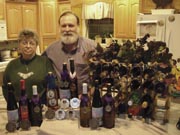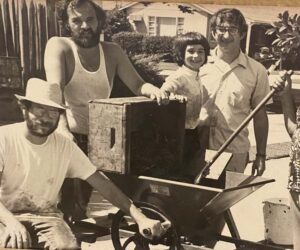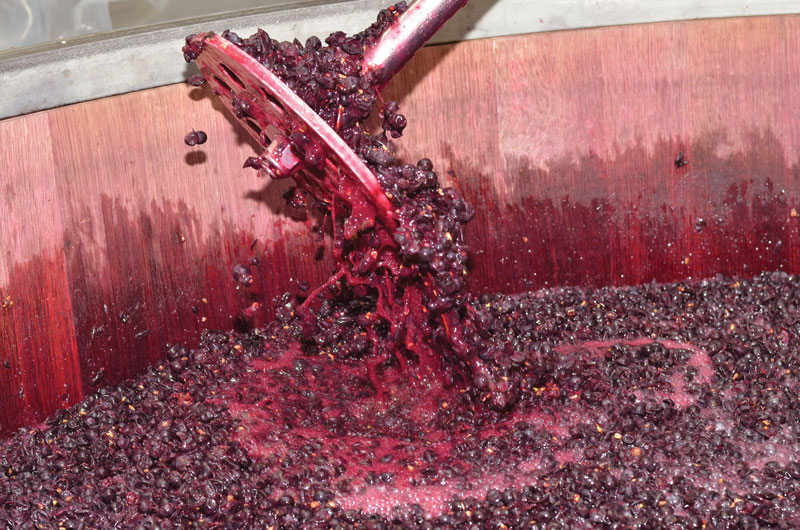In 1955, at age five, my grandparents taught me to make French/German/Native American mead wine. After finishing two days of hot grueling work canning fruit, Grandpa asked me if, “I could keep my mouth shut, otherwise we will both go to jail.” I answered in the affirmative with a nod. (Oklahoma liquor laws lagged behind most every state in the Union until the 70s.) “There are a lot of teetotalers that will turn us in,” he would say.
Grandma boiled the remains of fruit scraps that were prepared for canning (apple, peach, plum, cherry, blackberry, blueberry, raspberry, mulberry), mixed with honey. The kitchen air was thick with the steamed aroma of that fruit, and it always made me hungry. I was eager to please because at the end of these repeated tasks held all the fresh bread, creamy whole milk and jam I could eat.
Next we would proceed to the basement, with a steeping pot firmly clenched in Grandpa’s hot-pad hands. He made sorghum mead with all-natural fermentation with the same yeast starter used by my grandmother for bread. The steam heat from the pressure cooker was intense. The fruit bathed in the steam for a day. My only break was when Grandfather came down to the basement to empty the viscous (fruit and honey) syrup into the crock. He would leave me behind to stir until the liquid cooled, and all the foam was cleared a second time.
Grandfather added cream of tartar and one lemon or two small limes. I stirred, clockwise, stopping only to skim off foam or seeds, until the brew cooled enough to pour it through cheesecloth into a heavier ceramic crock. I held tight to one end of the cheesecloth, and we both twisted in opposite directions. Then he added “the real secret ingredients:” light barley malt and a large block of ice. I stirred until the ice block melted. Grandfather added a piece of Grandmother’s bread with a dark spread on it I later learned to be Marmite — not very noticeable in the finished wine.
He covered the crock, sealed it with beeswax, and stuffed the vent-hole with cotton. I missed much of the fining stage (egg whites) and the bottling process.
Grandpa bottled in brown spring-corked gallon jugs, accumulated from Sonny Clute, whose family had owned the RX Drugstore in West Tulsa. Such was my “first time.”
When the family gathered for Thanksgiving, the six uncles and my father would head to the basement for a nip of last year’s recipe. There were 32 cousins including myself, and I took great pride at dinner when Grandmother would serve and announce, “Keith helped (with dinner). Put up every bushel,” and my uncles and aunts would nod their praise and toast their glasses in my direction. Grandma had tried once to remind Grandpa to announce the fact I had a hand in the wine too, but he sternly replied, “They know.” He didn’t want the other Grandchildren to know that fact. “It’s worrisome enough that he knows.”
But we all knew the truth. Once, my older cousins “snagged” a bottle before leaving for college. Boy, did we all have hell to pay for it, too! I was wise and only took a couple of swigs from a gallon jug, then replaced it with water. But not before learning the hard way not to drink from the crock. My first inclination had been that the loss would be easier to conceal. There is no way this bittersweet froth will be a luscious sweet elixir in just a few months, I thought. I slept on the bathroom floor that night; you may guess why?
In 1987, an uncle gave me a bottle of strawberry wine from the original start —acquired some time before 1870. I was given Grandmother’s bread start from an Aunt; she had nurtured it for 50 years. Grandmother’s bread start could be put in the freezer, then restarted anytime by thawing and feeding it with a little sugar or some honey-Amish (Wayland-Hurdwolfstig/Wheylander’s) bread start, or friendship bread start, which was our family’s custom.
Sonny Clute rekindled my interest in making homemade wine by asking in May of 1997 if I could make wine as good as my Grandfather’s. Everyone knows my good Baptist grandfather made wine — it was an ongoing joke. My seven uncles have since marveled at my ability to stay with Grandma’s canning and Grandpa’s winemaking traditions.
The first time I purchased modern yeast, Charley, at Mecca Coffee Company in Tulsa, Oklahoma asked what recipe I used. I told him bread yeast and honey. A scowl came across his face, but after giving his wife a bottle of mead, they both agreed I was doing something right!





